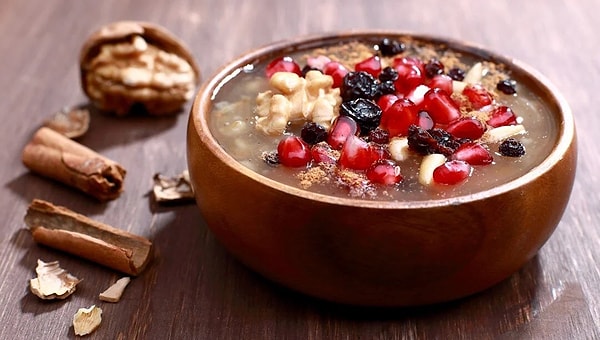In the realm of Turkish cuisine, a treasure trove of culinary delights awaits, each dish weaving a tale of history and culture. Among these gastronomic gems, Aşure stands as a testament to the harmonious blend of tradition and taste. Often referred to as 'Noah's Pudding,' Aşure is a hearty and symbolic dessert that has stood the test of time, captivating palates and hearts with its comforting flavors and rich heritage. Join us on a journey to uncover the story behind this beloved Turkish dessert, exploring its origins, preparation, and its cherished place in Turkish culture.
Aşure: Explore the Delights of Noah's Pudding, a Timeless Turkish Dessert

A Taste of Tradition and History

Aşure's history is deeply intertwined with Turkey's diverse cultural tapestry, carrying traces of ancient Anatolian traditions and the echoes of centuries gone by. The dessert's nickname, 'Noah's Pudding,' is rooted in a tale that harks back to biblical times. According to legend, as Noah's ark came to rest upon Mount Ararat, a jubilant feast ensued, where the remaining grains were combined to create a wholesome, nourishing pudding. This symbolic dish was shared as a celebration of renewal and unity – a tradition that continues to this day during the observance of 'Aşure,' a significant day in Islamic culture.
Ingredients and Preparation

At the heart of Aşure lies a rich and diverse combination of ingredients – wheat, barley, beans, rice, dried fruits, nuts, and a touch of fragrant spices. The magic, however, lies in the art of preparation. The medley of ingredients is slow-cooked together, allowing the flavors to meld and the textures to harmonize. The resulting dish is a delightful blend of sweet and nutty, with each ingredient contributing to the symphony of taste.
Flavors and Symbolism
Aşure is not just a dessert; it is a masterpiece of symbolism, reflecting unity, diversity, and the spirit of sharing. The diverse ingredients symbolize the harmony among different cultures and the shared experiences of humanity. The dessert's preparation often involves collective effort, where families and communities come together to cook and share Aşure. It's a reflection of the values of togetherness and compassion that are deeply ingrained in Turkish culture.
Cultural Significance
Beyond its delectable flavors, Aşure holds a place of cultural significance in Turkish society. This dessert is a cherished part of festive gatherings and religious observances, symbolizing unity, abundance, and gratitude. During the month of Muharram, the first month of the Islamic calendar, Aşure is prepared and shared with loved ones to commemorate the Aşure story of Noah's ark.
Savoring Aşure: A Culinary Journey
Embarking on a culinary journey to savor Aşure is an exploration of taste, tradition, and the warm embrace of Turkish hospitality. From bustling street-side eateries to elegant restaurants, this iconic dessert graces tables with its presence, inviting all who partake to savor not only its flavors but also the stories it carries. The hearty richness, the harmonious blend of ingredients, and the hints of history make each spoonful a reminder of the connection between past and present, culture and cuisine.
A Symbol of Unity and Traditions
Aşure, the beloved Noah's Pudding, is more than just a dessert – it is a bridge that connects generations, cultures, and stories. It brings to life the ancient tale of unity and hope while offering a taste of comfort that transcends time. As you savor the complex flavors of this Turkish delight, remember that you are indulging in a dish that has been savored for centuries, carrying with it the essence of tradition and the warmth of community.

